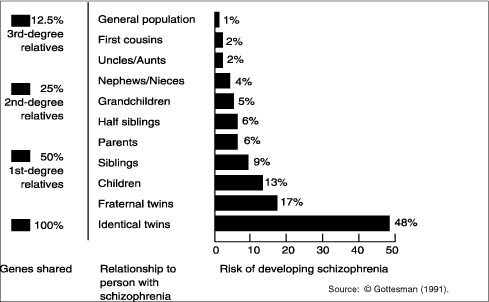Prevention of schizophrenia before it develops is something that is still in the early research stage but there are some very positive signs that the risk of developing schizophrenia can be controlled and lowered.
There are two different approaches to preventing schizophrenia that
are currently being researched;
1. Preventative measures that are taken well prior to any measurable
signs of the early phase of schizophrenia (also called the prodromal
phase, in medical terms).
2. Preventative measures taken during the prodromal period of schizophrenia.
(People typically show some early signs of schizophrenia well before
the full development of schizophrenia).
Preventing Schizophrenia - See the following articles for news and information on this exciting area of research
1.Schizophrenia Prevention - Tactics for Individual and Family Risk Reduction
2. Researchers edging closer to preventing schizophrenia
3. Can schizophrenia be prevented? (Neuropsychiatry Journal)
4.
Preventing Schizophrenia and Psychotic Behavior: Definitions and Methodological
Issues (research paper)
5.
New Book: Preventive
strategies for schizophrenic disorders - Perspectives, Opportunities
and Limits.
Reducing the Risk of Getting Schizophrenia
Just as it has become evident from recent genetics research that some
people are genetically predisposed towards certain diseases like heart
disease and Alzheimer's, it has also been determined that there are
some strong genetic factors that predispose some people to schizophrenia.
The strong genetic role in schizophrenia is shown in the following graph
which shows your probability of getting schizophrenia if someone else
in your family has schizophrenia - for example, if one identical twin
has schizophrenia research suggests that there is a 48% probability
that the second twin will also develop schizophrenia. As can be seen
by the graph - the more genes that a person shares with a person with
schizophrenia - the higher the risk that they will also develop schizophrenia.
(For more information, see: Heredity
and Genetics of Schizophrenia)
However, the fact that even if a person shares 100% of the genes (that
is, they are an identical twin) there is only a 48% of developing schizophrenia
- suggests that there are many "environmental" influences
that also determine whether a person develops schizophrenia. Environmental
- in this definition - includes everything from the nutritional environment
or viruses that a baby is subjected to in the womb, to social environment
growing up, to teen drug use or stress.

Increasingly research has identified different environmental factors
that seem to have an influence on the probability of people developing
schizophrenia. This research is extremely difficult to do (and very
expensive) because it requires the monitoring and comparisons of large
numbers of variables in a large number of people over a long period
of time to get statistically valid information. What researchers have
instead now focused on are retrospective analysis of populations in
a process called epidemiology.
During the past two decades a number of factors have been identified
that appear to be involved in the development of schizophrenia. What
has not yet been done for the public is the identification of actions
that a person might want to take to minimize the chances that he or
she would develop the disease.
Recently, schizophrenia researchers and professionals have begun to
address this issue of prevention (see Considering
Schizophrenia from a Prevention Perspective). We are leveraging
this research to develop some ideas for some concrete steps that families
can take today (short of taking low doses of medications prior to onset
of schizophrenia - since the research is still going on in this area,
and the costs are high) to minimize the further chances for schizophrenia.
For More Information See the full list of Genetic and Environmental Factors involved in schizophrenia and possible prevention approaches



